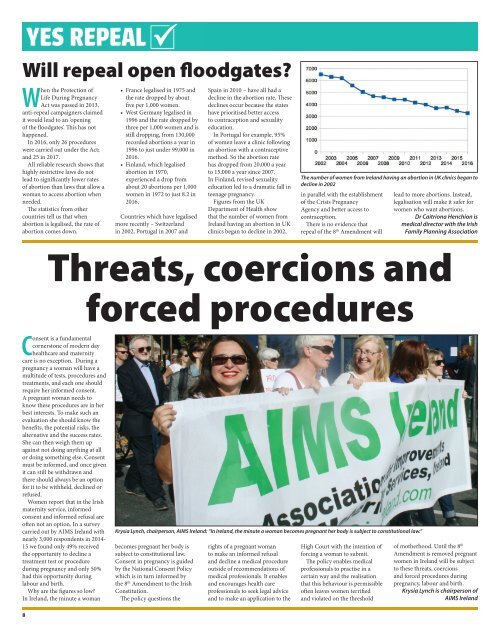YesRepealReferendumSpecial
You also want an ePaper? Increase the reach of your titles
YUMPU automatically turns print PDFs into web optimized ePapers that Google loves.
Will repeal open floodgates?<br />
When the Protection of<br />
Life During Pregnancy<br />
Act was passed in 2013,<br />
anti-repeal campaigners claimed<br />
it would lead to an ‘opening<br />
of the floodgates’. This has not<br />
happened.<br />
In 2016, only 26 procedures<br />
were carried out under the Act;<br />
and 25 in 2017.<br />
All reliable research shows that<br />
highly restrictive laws do not<br />
lead to significantly lower rates<br />
of abortion than laws that allow a<br />
woman to access abortion when<br />
needed.<br />
The statistics from other<br />
countries tell us that when<br />
abortion is legalised, the rate of<br />
abortion comes down.<br />
• France legalised in 1975 and<br />
the rate dropped by about<br />
five per 1,000 women.<br />
• West Germany legalised in<br />
1996 and the rate dropped by<br />
three per 1,000 women and is<br />
still dropping, from 130,000<br />
recorded abortions a year in<br />
1996 to just under 99,000 in<br />
2016.<br />
• Finland, which legalised<br />
abortion in 1970,<br />
experienced a drop from<br />
about 20 abortions per 1,000<br />
women in 1972 to just 8.2 in<br />
2016.<br />
Countries which have legalised<br />
more recently – Switzerland<br />
in 2002, Portugal in 2007 and<br />
Spain in 2010 – have all had a<br />
decline in the abortion rate. These<br />
declines occur because the states<br />
have prioritised better access<br />
to contraception and sexuality<br />
education.<br />
In Portugal for example, 95%<br />
of women leave a clinic following<br />
an abortion with a contraceptive<br />
method. So the abortion rate<br />
has dropped from 20,000 a year<br />
to 15,000 a year since 2007.<br />
In Finland, revised sexuality<br />
education led to a dramatic fall in<br />
teenage pregnancy.<br />
Figures from the UK<br />
Department of Health show<br />
that the number of women from<br />
Ireland having an abortion in UK<br />
clinics began to decline in 2002,<br />
The number of women from Ireland having an abortion in UK clinics began to<br />
decline in 2002<br />
in parallel with the establishment<br />
of the Crisis Pregnancy<br />
Agency and better access to<br />
contraception.<br />
There is no evidence that<br />
repeal of the 8 th Amendment will<br />
lead to more abortions. Instead,<br />
legalisation will make it safer for<br />
women who want abortions.<br />
Dr Caitriona Henchion is<br />
medical director with the Irish<br />
Family Planning Association<br />
Threats, coercions and<br />
forced procedures<br />
Consent is a fundamental<br />
cornerstone of modern day<br />
healthcare and maternity<br />
care is no exception. During a<br />
pregnancy a woman will have a<br />
multitude of tests, procedures and<br />
treatments, and each one should<br />
require her informed consent.<br />
A pregnant woman needs to<br />
know these procedures are in her<br />
best interests. To make such an<br />
evaluation she should know the<br />
benefits, the potential risks, the<br />
alternative and the success rates.<br />
She can then weigh them up<br />
against not doing anything at all<br />
or doing something else. Consent<br />
must be informed, and once given<br />
it can still be withdrawn and<br />
there should always be an option<br />
for it to be withheld, declined or<br />
refused.<br />
Women report that in the Irish<br />
maternity service, informed<br />
consent and informed refusal are<br />
often not an option. In a survey<br />
carried out by AIMS Ireland with<br />
nearly 3,000 respondents in 2014-<br />
15 we found only 49% received<br />
the opportunity to decline a<br />
treatment test or procedure<br />
during pregnancy and only 50%<br />
had this opportunity during<br />
labour and birth.<br />
Why are the figures so low?<br />
In Ireland, the minute a woman<br />
Krysia Lynch, chairperson, AIMS Ireland: “In Ireland, the minute a woman becomes pregnant her body is subject to constitutional law.”<br />
becomes pregnant her body is<br />
subject to constitutional law.<br />
Consent in pregnancy is guided<br />
by the National Consent Policy<br />
which is in turn informed by<br />
the 8 th Amendment to the Irish<br />
Constitution.<br />
The policy questions the<br />
rights of a pregnant woman<br />
to make an informed refusal<br />
and decline a medical procedure<br />
outside of recommendations of<br />
medical professionals. It enables<br />
and encourages health care<br />
professionals to seek legal advice<br />
and to make an application to the<br />
High Court with the intention of<br />
forcing a woman to submit.<br />
The policy enables medical<br />
professionals to practise in a<br />
certain way and the realisation<br />
that this behaviour is permissible<br />
often leaves women terrified<br />
and violated on the threshold<br />
of motherhood. Until the 8 th<br />
Amendment is removed pregnant<br />
women in Ireland will be subject<br />
to these threats, coercions<br />
and forced procedures during<br />
pregnancy, labour and birth.<br />
Krysia Lynch is chairperson of<br />
AIMS Ireland<br />
8


